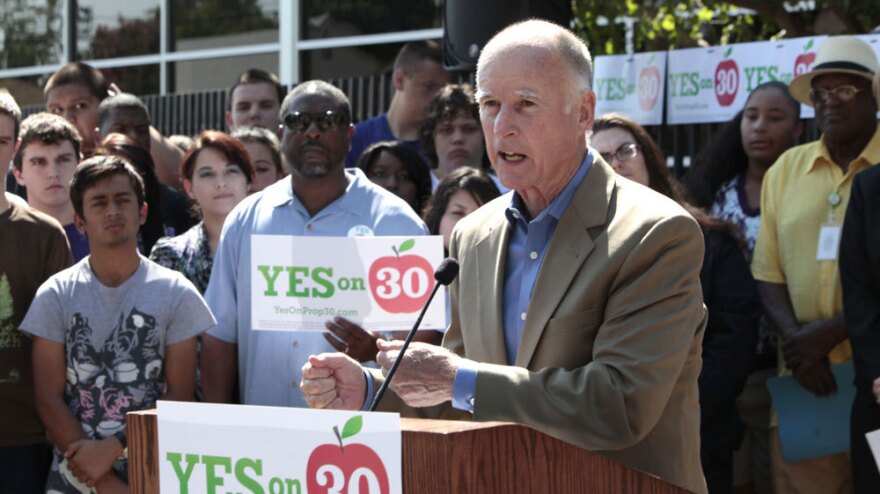Tax increases will join political candidates on the November ballot in several states struggling to plug some big holes in their budgets.
One of the most closely watched measures is in California, where Gov. Jerry Brown has staked his reputation on closing his state's multibillion-dollar budget gap.
On Wednesday in Sacramento, Brown officially kicked off his campaign to get voter approval to raise taxes via the Schools Public Safety Protection Act, also known as Proposition 30.
"We all know what's at stake," Brown said, flanked by a group of high school students. "The kids standing behind me have their future at stake."
Filling Gaps
Proposition 30, if approved by voters, would temporarily increase the state sales tax by one-quarter cent, and raise income taxes on the state's highest earners. The new taxes are projected to raise about $6 billion in revenue.
When Brown, a Democrat, was campaigning for governor two years ago, California's budget was drowning in red ink. Since then, he's signed a budget that slashed spending on social services, and promised voters that he would not seek a tax hike without their approval.
"And if we cannot pass Prop. 30," Brown said, "we're taking a half-billion out of our colleges and universities, and we're taking 5 1/2 billion out of our schools. Doesn't make sense."
Critics say Brown's measure — and his pitch — are disingenuous. Not all of the money raised will be allocated to schools, they argue. And, they add, there is a competing tax hike measure dedicated entirely to school funding.
Despite those critiques, polling shows support for Brown's measure at more than 50 percent.
Corey Cook, a professor of politics at the University of San Francisco, says the governor has seized on what may prove to be a winning approach.
Ultimately, he says this election is particularly significant because it presents voters with a choice: "Do you actually want your kids to come home from school three weeks early, or are you willing to pay more in taxes?"
Targeted And Specific
California isn't the only state where a tax hike proposal is linked to a specific goal.
In South Dakota, a ballot measure would raise the state sales tax from 4 to 5 percent, with the funding earmarked for K-12 education and the state's Medicaid program.
In Arkansas, there's a half-cent sales tax proposal designed to pay for a four-lane state highway system. Jay Barth, a political science professor at Hendrix College in Conway, Ark., says the measure trails in the polls.
"Yeah, Arkansans have a real queasiness about tax increases for general revenues," Barth says. "There's not a lot of trust in government to use money wisely."
And yet, Barth says recent history shows that Arkansans will vote to raise taxes — when they are convinced that the money will go to a specific and worthy project.
Politicians know "specific and worthy" is the threshold just about everywhere, says Arturo Perez, a fiscal analyst who follows state tax issues for the National Conference of State Legislatures. Savvy politicos then shape their requests to voters accordingly.
"When voters are asked to consider a tax increase, the likelihood that there is an earmark or dedicated expenditure of the revenues for a specific program is very high," Perez says.
There are a handful of other states with tax measures on the ballot this year, but those seek to reduce revenue collection, mainly by expanding tax exemptions and limiting property tax assessments.
Copyright 2021 NPR. To see more, visit https://www.npr.org.




